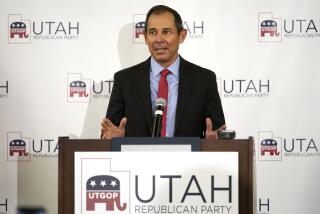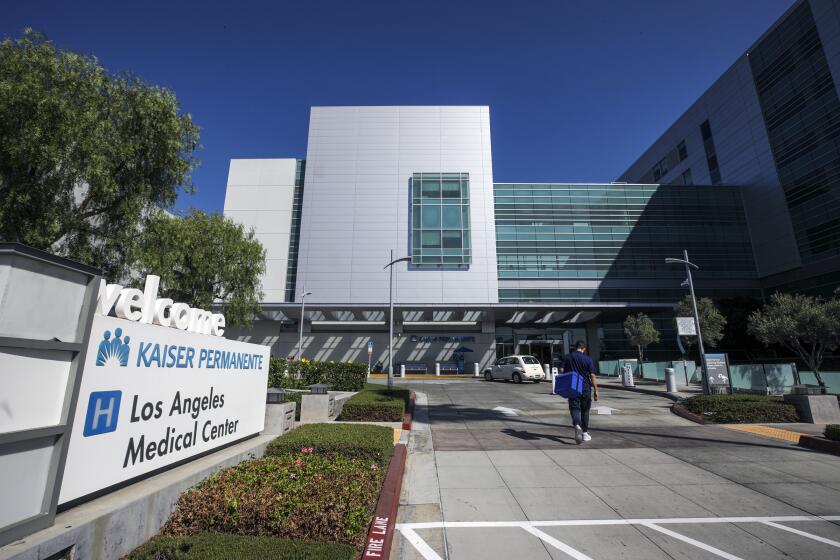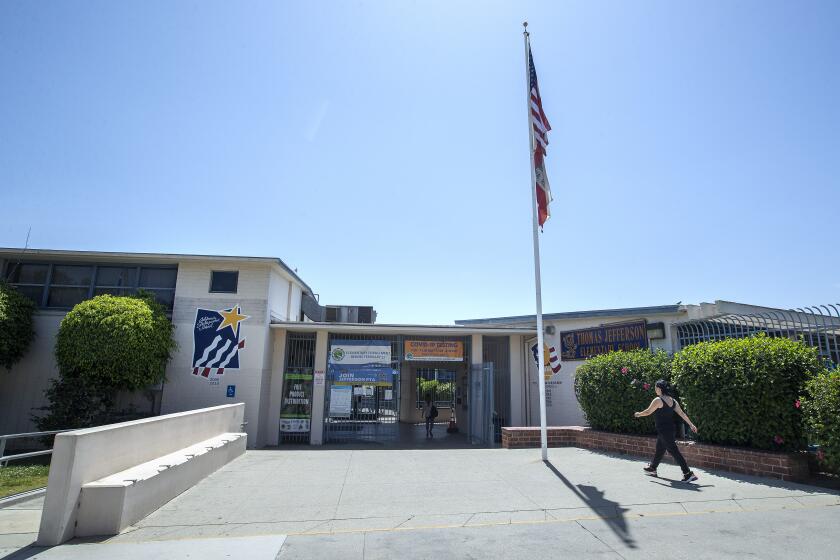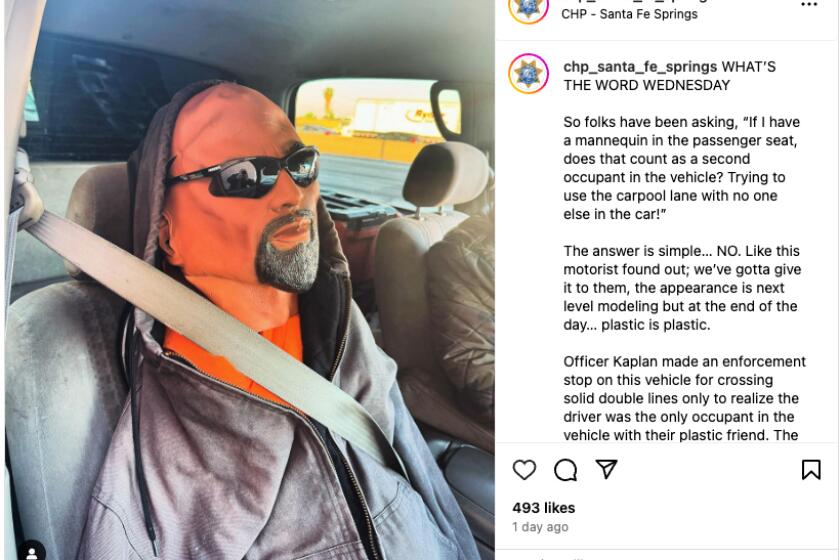U.N. leader asks Hollywood for help in fight against global climate change
Ban Ki-moon, the normally buttoned-up Secretary General of the United Nations, swept into Los Angeles during Oscar week playing the role of Hollywood pitchman.
His message: Make global warming a hot issue.
“I need your support,” he told entertainment industry insiders during a daylong forum Tuesday that focused on recent heat waves, floods, fires and drought, which scientists link to human-induced climate change.
“Animate these stories!” Ban pleaded. “Set them to music! Give them life! Together we can have a blockbuster impact on the world.”
If the pitch sounds a tad desperate, it’s not surprising. In recent years, public concern over climate change has plummeted in the polls, U.N. efforts to craft a new global climate treaty have been unsuccessful, and Congress has rejected federal legislation to curb greenhouse gas emissions.
The U.N. has long courted such celebrities as Audrey Hepburn, Mia Farrow, George Clooney and Angelina Jolie to be “goodwill ambassadors” for peacekeeping and anti-poverty efforts, but reaching out to writers, directors and producers to incorporate climate change issues in movies, television and social media is new.
Global warming films thus far have had mixed appeal. The apocalyptic 2004 “The Day After Tomorrow” flopped, but Al Gore’s 2006 “An Inconvenient Truth” won an Oscar.
In 2008, the animated hit “Wall-E,” and last year, “Avatar,” both with save-the-planet plots, sparked new interest in environmental themes.
But actor Don Cheadle, who spoke at the U.N. forum, cautioned: “Most people on Friday night are not going out to see something that tastes like medicine. They want entertainment.”
Dan Hassid, a Walt Disney Studios vice president who was in the audience, said the U.N. climate-change effort “feels like an early step. How do you make it marketable, palatable and engaging without preaching?”
About 400 writers, directors, producers, agents and network executives attended the outreach events: a series of panels at the Hammer Museum, moderated by Larry King; a lunch for selected bigwigs; tete-a-tete meetings between high-powered industry players and top U.N. officials; and a star-studded dinner where Ban was introduced by Charlize Theron, and Mayor Antonio Villaraigosa took a turn playing the drums.
Some participants had climate-themed projects in tow. Actor Djimon Hounsou said he was developing a film relating climate change in an African village to New Orleans’ Hurricane Katrina. Director James Brooke touted his upcoming documentary on Africa’s Lake Victoria, which he called “one of the planet’s early warning points, like the Arctic and the Amazon.”
But few people see documentaries, Brooke acknowledged. “We need to integrate climate change into what people watch on TV,” he said. “What about a show like ‘The Biggest Loser,’ except it would be about decreasing our carbon footprint?”
Several guests noted that oil and auto companies, major emitters of planet-heating carbon dioxide, advertise on television series. “You don’t want to offend your sponsors,” said director David Carson, who has worked in TV but is casting a film about a U.N. refugee worker in Thailand.
To coordinate with Hollywood, the U.N. has set up an office, the “Creative Community Outreach Initiative” in partnership with the United Nations Foundation, funded by media mogul Ted Turner. Past projects include an episode of “The Flying Chef” filmed at U.N. headquarters and featuring dishes from seven countries; an episode of “Law & Order: Special Victims Unit” dealing with children and armed conflict; an episode of “Ugly Betty” highlighting the use of mosquito nets to prevent malaria; and the hosting of the world premiere of the Disney film “Tinker Bell and the Lost Treasure.”
The climate effort, managed by the same office, has broader ambitions. “You have power and influence to send to millions and billions of people around world,” Ban told his Los Angeles audience. “To make planet Earth environmentally sustainable is a political and moral imperative.”
Also speaking on panels were Indian economist Rajendra Pachauri — chairman of the Intergovernmental Panel on Climate Change, the group of some 2,500 scientists who won the 2007 Nobel Peace Prize for assessing the effects of greenhouse gases — and Costa Rican diplomat Christiana Figueres, who led global treaty negotiations in Cancun as the head of the U.N. Framework Convention on Climate Change.
“There’s a huge gap between what governments can do, given political constraints, and what they should do,” Figueres told Hollywood executives. “That’s where you come in. ... We need you to make it sexy and cool to bring about the energy revolution that has to happen.”
King asked Pachauri if he had a “sexy story we could make into a film.”
Pachauri said his institute in India had made a three-minute movie about a village woman who was given a solar lantern. “It brings tears to your eyes,” he said. “It can transform the lives of those who are living in darkness.”
King’s response — “Maybe we can get Angelina Jolie to light the lamps” — prompted chuckles from the audience.
One questioner suggested that the U.N. model its efforts on Hollywood, Health & Society, an initiative funded by the Centers for Disease Control and Prevention and other agencies and foundations to incorporate into television shows information on such issues as cancer, diabetes, and AIDS.
Assistant Secretary-General Robert Orr agreed, saying, “It’s a darn good playbook.”
But Marshall Herskovitz, a veteran producer and director who has a climate-related project in the works, dismissed the comparison. “Everybody is interested in health,” he said. “But audiences see climate change as a distant phenomenon that affects parts of the world we don’t see.”
Unfortunately, Herskovitz said, “the best messaging on climate change by far is by the deniers. Chevron has a brilliant TV campaign. They would lead you to believe that climate change is being solved by the oil business.”
The U.N. campaign focuses not just on TV and movies, but also on social media. While in L.A., Ban met with members of the band Linkin Park, who borrowed a U.N. video on Haiti last year and set it to music, boosting its viewership from 6,000 to 6 million. The band pledged to help with the climate change campaign.
“I’m an Elvis kind of guy,” Ban joked in his dinner speech. “But I am now Linkin Park’s biggest fan.”
More to Read
Start your day right
Sign up for Essential California for news, features and recommendations from the L.A. Times and beyond in your inbox six days a week.
You may occasionally receive promotional content from the Los Angeles Times.







